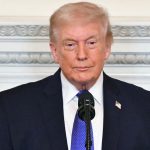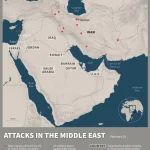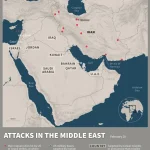Rep. María Elvira Salazar, R-Fla., is planning on introducing a bill Saturday commemorating the 200th anniversary of the Monroe Doctrine, which the congresswoman says is “now more important than ever” as “China, Russia and Iran are trying to invade the Western Hemisphere” and win domineering influence on Latin America over the U.S.
As China specifically peddles influence through the Belts and Roads project, essentially bankrupting Latin American countries on the promise of helping them build new roads, dams and bridges, Salazar argues that the U.S. over the past two to three decades has essentially “forgotten the Western Hemisphere.”
“And that is why these evil empires like Russia, China and Iran are invading our territory,” Salazar told Fox News Digital. “So we, the United States, we have to wake up and understand that this is our territory and that no other country is going to treat the Latin Americans better than the United States.”
“Before, 200 years ago when Monroe signed it, it was Spain, France and England. They did not have the same type of malicious agenda as the Chinese, the Russians and the Iranians. That’s why we need to protect America for the Americans,” the congresswoman said. “Because the United States happens to be in the Western Hemisphere is the most generous country — or superpower in the world. And we have the great luck — or blessing to be neighbors with the United States. And that’s why we need to keep the relationship very close.”
President James Monroe articulated what became to be known as the “Monroe Doctrine” on Dec. 2, 1823, telling members of Congress in his seventh annual message that, “a principle in which the rights and interests of the United States are involved, that the American continents, by the free and independent condition which they have assumed and maintain, are henceforth not to be considered as subjects for future colonization” by foreign powers.
To commemorate its 200th anniversary, Salazar will introduce a resolution Saturday calling on the House to reassert “the rights and interests of the United States, in accordance with the Monroe Doctrine, to oppose a foreign power extending malign influence that could endanger or undermine the democracies of the Western Hemisphere,” and recognize “the principles of hemisphere freedom and independence, as enshrined in the Monroe Doctrine, as an enduring foundational cornerstone of the foreign policy of the United States.”
At its onset, the Monroe Doctrine “asserted a spirit of solidarity with the newly independent republics of Latin America” and the U.S. at a time when the Russian Empire was attempting to claim and colonize areas of Alaska and the Pacific Northwest. The U.S. government also evoked the Monroe Doctrine in 1865 to help exert “diplomatic and military pressure” in helping the Mexican president at the time to lead a successful revolt against the French Empire.
Notably, President John F. Kennedy invoked the Monroe Doctrine nearly a century later when the Soviet Union built missile launch sites in Cuba in 1962, and as part of the successful actions of his administration to see the Soviet missiles withdrawn from the dismantled missile launch sites in Cuba.
Two centuries after the doctrine’s inception, Salazar told Fox News Digital that countries like China and Russia easily peddle influence from across the globe through social media.
“China, the only thing they want to do is that they want to penetrate and then make those countries slaves like they have with the Uyghurs,” Salazar said. “The Chinese — the way they treat their own citizens, how do you think they’re going to treat the Peruvians or the Ecuadorians better?… The United States has been a very beneficial influence in the Western Hemisphere since the Spanish crown was kicked out in 1810. So let’s keep it that way.”
CHINA TRAINS CHILDREN FOR ‘IRON ARMY’ IN LATEST EFFORT TO CREATE NATIONAL ‘COMBAT READINESS’: REPORT
Salazar told Fox News Digital she believes the massive influx of illegal immigrants making the treacherous journey through Latin America and toward the U.S.-Mexico border is evident of which world superpower has the best perception of taking care of its inhabitants.
“That’s why all of Latin America wants to cross the southern border and come to the United States because they know that the United States is the best out of all the superpowers. I don’t see the Hondurans and the Nicaraguans trying to go to China. I see the Chinese trying to come to the United States through Central America,” Salazar said. “Unfortunately, the problem is that because we have been so absent from Latin America, we have been so distant. That’s why the Chinese have found a pathway. But the moment that Latin America understands that the United States is back to be with them and to fund and to bring some prosperity through the American companies, those doors will be shut to China and Russia.”
The Biden administration has faced intense scrutiny from Republicans in Congress over his administration’s handling of the border crisis.
U.S. Assistant Secretary of State for Energy Resources Geoffrey Pyatt testified before the House Foreign Affairs Committee in June about the Biden administration’s efforts “to strengthen global energy security and counter the PRC’s attempts to create economic dependencies and to coerce others through its ‘Belt and Road’ and similar initiatives.”
“In Latin America and the Caribbean, the United States remains the partner of choice — a message I heard repeatedly during my recent trip to Guyana and Trinidad and Tobago,” Pyatt assured lawmakers earlier this year. “But we also see the PRC targeting Latin America for investments in critical minerals, energy grids, and renewables.”
According to a draft of the resolution obtained by Fox News Digital beforehand, Salazar stresses how the 2023 posture statement from the U.S. military’s southern command, which is responsible for planning and security operations in South and Central America and the Caribbean, “acknowledges that external malign actors like the People’s Republic of China and the Russian Federation are aggressively exerting influence over neighboring countries in Latin America and the Caribbean and raises concerns about Iranian intelligence and security activities.”
The southern command also “notes that the People’s Republic of China is encroaching upon sensitive critical infrastructure in the Western Hemisphere through investments, including in deep-water ports, cyber facilities, and space facilities which can have a potential dual use for malign commercial and military activities,” and notes that “the Russian Federation undertakes extensive disinformation campaigns in Latin America, bolsters authoritarian regimes like the Republic of Cuba, the Republic of Nicaragua, and the Bolivarian Republic of Venezuela, and pursues military engagement and gray zone operations in this region.”
The northern command, responsible for coordinating the defenses of Canada, Mexico and the Bahamas, warned in its 2023 posture statement, “Our competitors and potential adversaries, particularly the People’s Republic of China and Russia, continue to challenge the rules-based ‘international order’ and ‘seek to advance their interests and gain global advantages through political intimidation, economic coercion, cyber and information operations, asymmetric attacks on infrastructure, and the direct threat or actual employment of military force,’” Salazar’s resolution says.
























